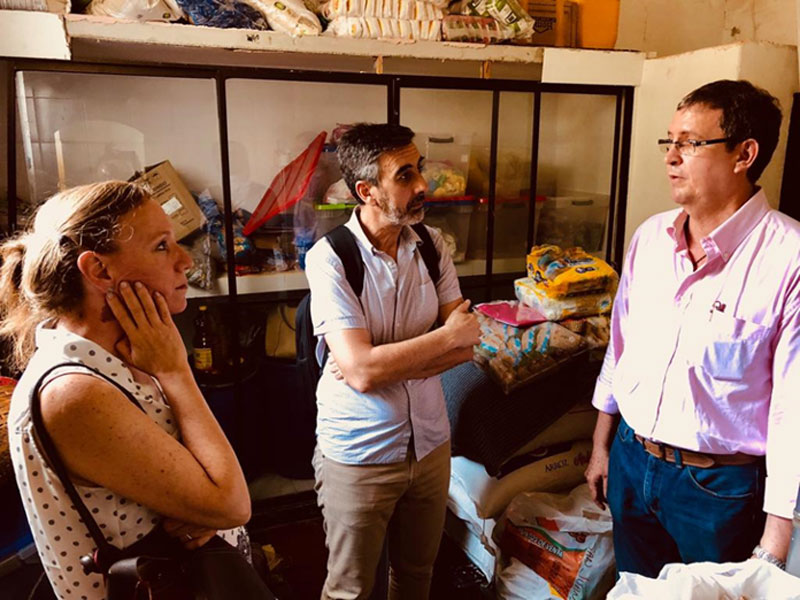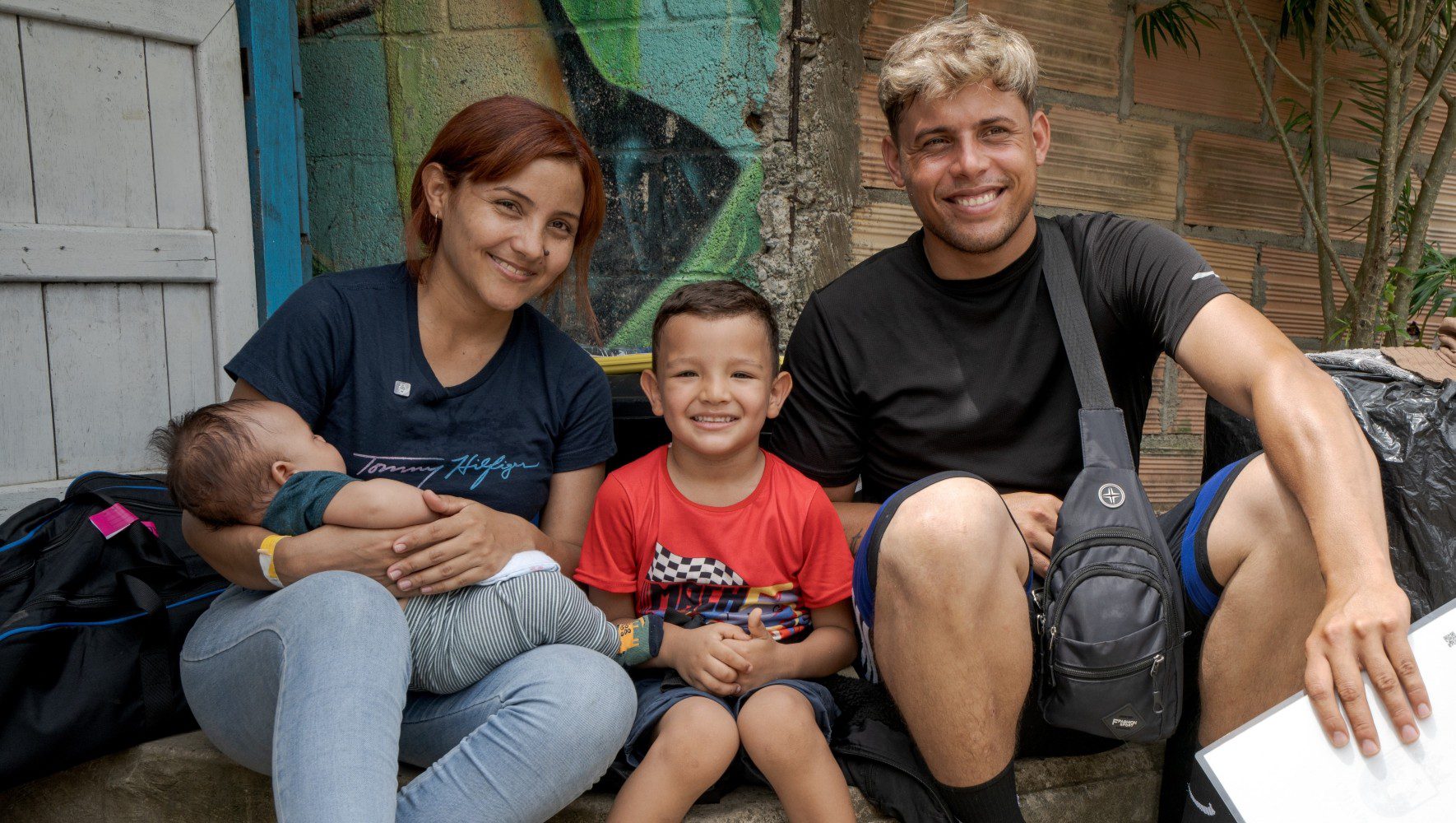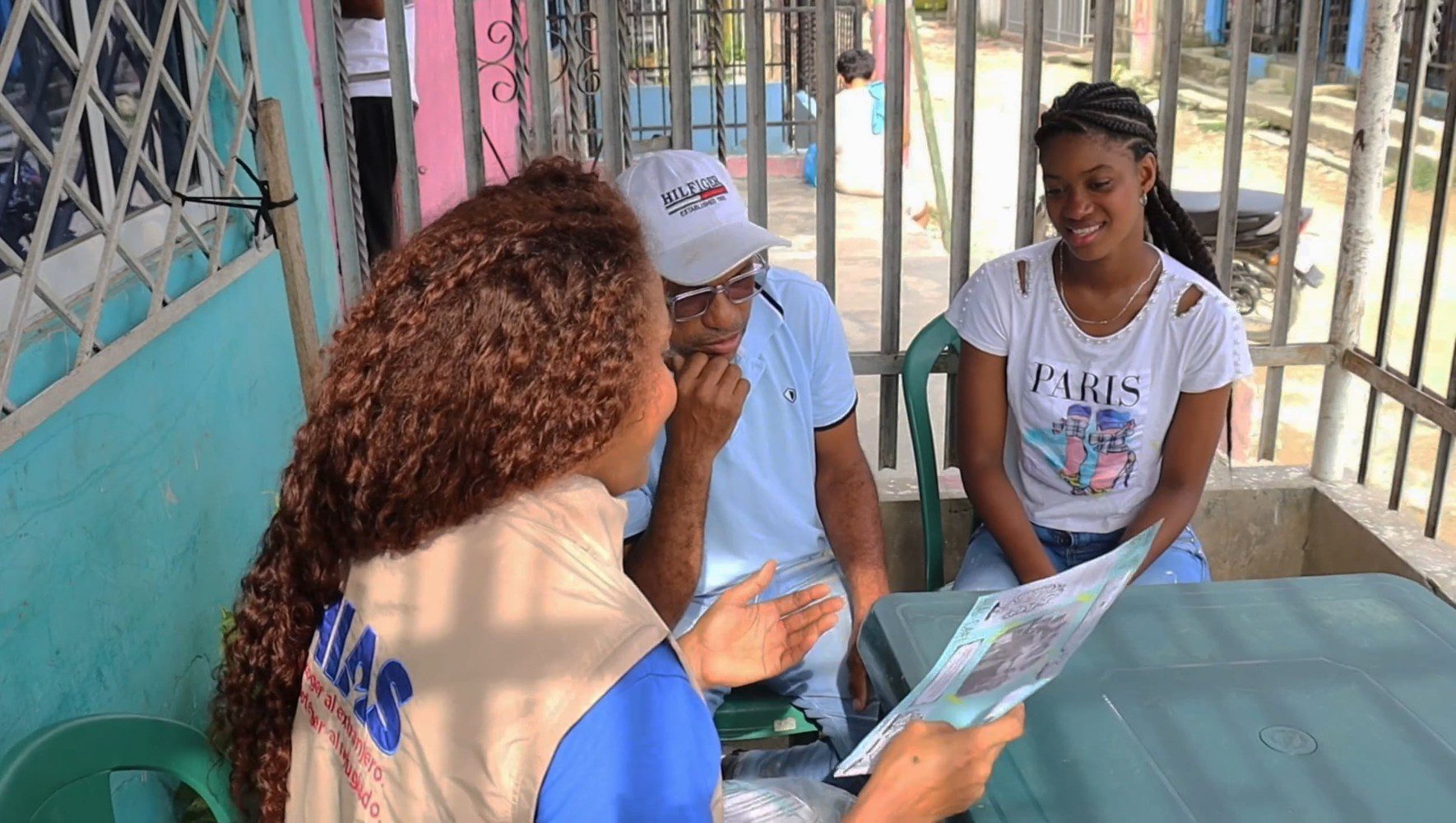Dispatch from Colombia: One Million Venezuelans Need Help
Nov 29, 2018

HIAS Ecuador National Director Sabrina Lustgarten and HIAS Regional Director Enrique Torrella Raymond, Latin America and the Caribbean, listen to Jose, who runs a soup kitchen that helps Venezuelan refugees.
(Rachel Levitan, HIAS)
Jose broke down crying as he told us of a young Venezuelan woman who gave birth in a hospital in Santa Marta, Colombia, only to be sent back to the streets to live with her newborn the next day. After days of listening to somber descriptions of the situation of Venezuelans seeking refuge in Colombia by government officials and United Nations staff, it was this moment, standing in the hot storeroom of a church-run soup kitchen, that hit hardest.
Our meeting with Jose, who runs a soup kitchen at the San Juan de Dios church in Santa Marta, and seeing the Venezuelan women and kids coming to eat one meal per day there brought home how desperate people are, and how few resources are available to support Venezuelans in Colombia.
Last month HIAS went on a fact-finding mission to assess the needs of Venezuelans in Colombia. Since 2015, some three million Venezuelans have left their country. Colombia is the largest host: officially, one million Venezuelans now live in Colombia, but UNHCR and others estimate this number to be much higher. Venezuelans continue to come in to Colombia looking for protection and assistance, with over 4,000 Venezuelans arriving in the country each day.
All of the HIAS staff were struck by the enormity of the struggle that Venezuelans face accessing their rights, whether to legal status, work, safe shelter, medical care, or education. Trafficking, workplace exploitation, xenophobia, and exclusion from medical and social services are all on the rise.
Despite several rounds of registration by the Colombian migration department, most Venezuelans do not have a regular legal status, and even those who do can rarely access rights or protection. Many young women come into Colombia to give birth because they falsely believe that their children will have access to Colombian citizenship. The asylum system is effectively broken in Colombia, and few refugees have been granted status by an under-resourced system.
Men, women, and children from Venezuela sell water, candies, and toys on the streets. In Cartagena, Barranquilla, Santa Marta, and Bogota, we were told that women “sell coffee” – a small cup costs two cents, while a “large cup,” referring to sex work, costs two dollars. When a teacher’s salary in Venezuela now averages three dollars a month, such a low fee for sex work is understandable. Despite the prevalence of survival sex work, and the violence that comes along with that work, no agencies are currently engaged in gender-based violence prevention or response programming.
Most Venezuelans live alongside the 6.5 million Colombian internally displaced people in the country, as well as the thousands of Colombians returning after living decades in Venezuela. They live in destitute conditions in extremely poor and underserved neighborhoods. Many sleep in parks and under highway underpasses without access to water or sanitation. Some rent small rooms from Colombians, but are not given access to the kitchen or bathroom or must “pay per flush,” which few can afford. In Bogota, a government-run space next to the main bus terminal has been made available for Venezuelans. But with more than 250,000 Venezuelans now in Colombia’s capital, this is far from adequate, and police regularly raid an unofficial shelter area across the street.
While all Venezuelan children, regardless of status, may attend school, the reality is that few are enrolled because local administrators are not aware that they may be admitted. At the same time, with so many Venezuelans coming into the country with illnesses that have gone untreated for months, the barriers they face trying to access medical care – due to lack of resources and awareness – is a serious public health concern.
Although there are numerous agencies present along the border with Venezuela, there is a dearth of NGOs and U.N. agencies responding along the Atlantic Coast and in Bogota, which combined host almost half a million Venezuelans.
The world’s humanitarian donors are finally catching on to the problem. European governments, U.N. agencies, the U.S. government, and corporate donors all have plans to increase their giving to respond to the vast needs of Venezuelans in Colombia and the region.
As part of HIAS’ new Refugee Rights framework, we want to ensure Venezuelans’ rights to access legal protection, live in safety, recover from the immediate shock of their displacement, and access dignified work that leads to both social and economic inclusion.
HIAS is looking into different ways to work in Colombia. We recognize the scale of the challenge, but we want to start helping.



